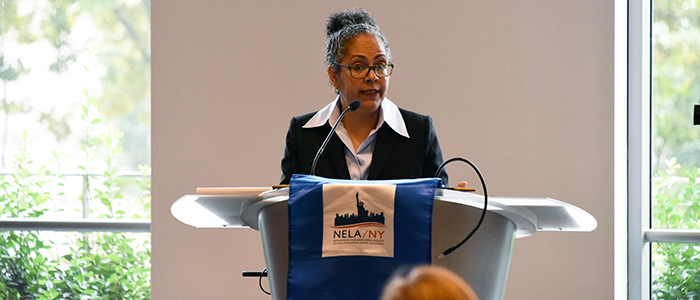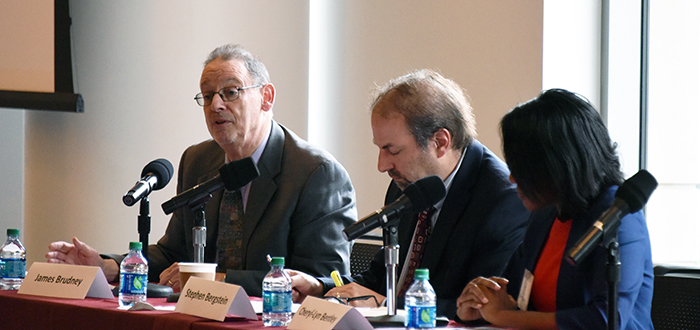In a famous study that illuminates gender discrimination in employment processes, musicians auditioning for a position in a symphony orchestra performed behind a screen so that the hiring jury would apprehend only the candidate’s playing of the instrument. Other considerations, such as the gender or physical appearance of the musician, would not come into play. Yet even with the screen, male musicians tended to fare better. The researchers conducting the study struggled to find out why; the male and female performers were similarly skilled. Finally it hit them: high heels make a distinctive sound as a person walks over to her chair and a screen does nothing to conceal this.
This was just one of many examples of hidden bias in employment that Fordham Law Professor Tanya Hernández gave in her talk entitled Diversity, Inclusion and Elimination of Bias in the Profession ” at a September 28 conference at Fordham Law School.
The event, organized by the New York affiliate of the National Employment Lawyers Association (NELA/NY), focused on current issues in employment law, and was attended by over 100 legal professionals, scholars, and students.
Fordham Law alumna and Stein Scholar graduate Melissa Lardo Stewart ’09, who now serves as a member of the board of NELA/NY and is a partner at Outten & Golden LLP, noted that the conference had a lot to offer current law students.
Plaintiffs-side employment law is a growing area in the #MeToo era, ” she said. I’m pleased that students will have a chance to learn about the substantive law and our practice area by attending panels and socializing with practitioners. ”

Tanya Hernández
While Hernández’s talk addressed implicit bias in hiring practices generally, she homed in on the legal profession. She pointed to studies in the legal field that show that lawyers commit as much employment discrimination as professionals in other fields. The data is crystal clear by now. Implicit biases against minorities and women strongly affect the hiring process, and black associates are scrutinized in a way that white associates are not.
Hernández ended her talk on a hopeful note. Although individuals cannot totally eliminate the biases they have, she said, we are not slaves to our implicit associations. ” Studies have also shown that people can override hidden prejudices by learning more about how they function and through subsequent deliberate efforts to combat them.
Following Hernández’s talk was a panel on recent developments pertaining to employment law in the U.S. Supreme Court and U.S. Court of Appeals for the Second Circuit. Fordham Law Professor James Brudney briefed the audience on the former.

James Brudney, Stephen Bergstein, and Cheryl-Lyn Bentley
All the big Supreme Court cases this year ruled against employees, ” he said. Many of these cases resulted in 5-4 decisions, with the issue often coming down to dueling dictionary definitions of a single word. So which dictionary should be used? There’s no definitive answer, but this has not stopped some justices from trying to concoct one. The Supreme Court is obsessed with dictionaries, “Brudney said.
The next panel addressed criminal history in the workplace. Moderator Christopher McNerney used an example involving mixed-up identities to showcase a pervasive problem in the field. A man with a common first and last name was terminated from a job for felonies that he did not commit he had been mistaken for someone else due to a poorly conducted background check. He brought a lawsuit against his former employer, but many facing the same situation are not able to.
The final panel addressed the practical aspects of employment lawyers dealing with the media. Panelists discussed how to leverage media attention in order to win a case and stressed that there is added pressure on the defendant when the press is involved and working to expose them for the world to see. Panelist Anne Clark, a former adjunct professor at Fordham Law, was sure to highlight the potential pitfalls of going to the press. Once you get the attention of the press, you cannot control the coverage that you get thereafter, ” she cautioned.
The conference concluded with a networking hour, where Fordham Law students had the opportunity to make connections with top professionals in the field of employment law.

